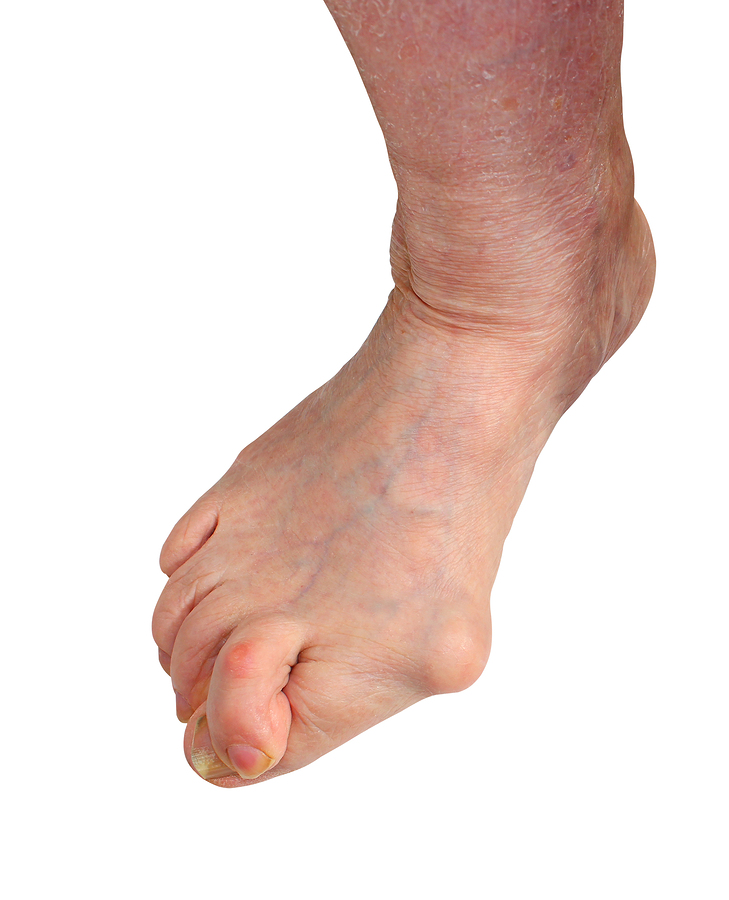BUNION TREATMENT & SURGERY IN FREEHOLD, NJ
Reviewed by AOSMI’s Trained Foot and Ankle surgeons, Dr. Alison Dewaters, and Dr. Wesley Nesbit.
WHAT IS A BUNION?

Bunions are big, bony lumps that are caused by years of abnormal motion and pressure put on the joint of the base of the big toe. Bunions carry much of the weight while you’re walking, and therefore cause an especially severe amount of pain that can hinder you from doing daily activities. If you’re experiencing bunion pain or need bunion surgery, the team
at the Advanced Orthopedics and Sports Medicine Institute is here to help. Our team of foot and ankle doctors have a stellar reputation in the Freehold, NJ community as a facility that offers highly personalized and comprehensive bunion pain treatment. We understand that bunion pain is a serious issue that can lower your quality of life, which is why we will work hard to alleviate your discomfort and get you back on your feet as soon as possible.
NON-SURGICAL BUNION TREATMENT OPTIONS AT AOSMI
Board-certified, fellowship-trained podiatrists at AOSMI can help you treat your bunions by recommending a number of non-surgical treatment options that are less invasive than bunion surgery, including:
- Minimally invasive treatment options
- Medication management
- Medication Management: Our podiatrists may prescribe oral anti-inflammatory medications to manage pain and inflammation associated with bunions. These medications can help alleviate discomfort and improve your quality of life.
- Bunion pads
- Bunion Pads: Bunion pads are cushioning devices that can be placed over the bunion to reduce friction and pressure on the affected area. They provide additional comfort and protection, especially when wearing shoes.
- Orthotics
- Orthotics: Custom-made or over-the-counter orthotic inserts can help redistribute pressure on the foot, improve alignment, and alleviate bunion-related pain. These inserts can provide relief and prevent further progression of the bunion.
- Changing shoes
- Changing Shoes: Wearing well-fitting, supportive shoes with a wide toe box can reduce pressure on the bunion and help prevent worsening of the condition. Our podiatrists can provide recommendations for appropriate footwear.
BUNION SURGERY AT AOSMI
If non-surgical bunion treatment methods have been exhausted, your podiatrist may recommend surgery to provide bunion pain relief and restore normal alignment to the foot. Bunion surgery typically involves an incision in the top or side of the big toe joint and the removal or realignment of soft tissue and bone. Small screws, plates, or wires may be used to hold the bones in place.
To learn more about the bunion surgery and treatment options offered at AOSMI for those in the Freehold, NJ, area, contact us today.
Bunion Pain Treatment Frequently Asked Questions
What causes bunions?
Bunions are often caused by a combination of factors, including genetics, foot structure, and improper footwear. They can develop when the big toe joint becomes misaligned, causing the big toe to lean toward the second toe. This misalignment leads to the formation of a bony bump on the side of the foot.
How do you get rid of bunions without surgery?
Non-surgical approaches to manage bunions include:
– Wearing supportive footwear with a wide toe box
– Using bunion pads or cushions to alleviate pressure
– Custom orthotic inserts to improve foot alignment
– Applying ice to reduce pain and inflammation
– Taking over-the-counter pain relievers
– Stretching and strengthening exercises for the foot muscles
– Avoiding high heels and narrow shoes
While these methods can alleviate symptoms, they may not eliminate the bunion entirely.
What does bunion pain feel like?
Bunion pain can vary from a dull ache to sharp discomfort. It’s often felt at the base of the big toe, where the bony bump forms. The pain may worsen when walking, wearing tight shoes, or engaging in physical activities that involve the feet.
How do you relieve bunion pain at home?
You can try the following home remedies to relieve bunion pain:
– Wear comfortable, supportive shoes with a wide toe box.
– Use bunion pads or cushions to reduce friction and pressure.
– Apply ice for 15-20 minutes to reduce inflammation.
– Take over-the-counter pain relievers as directed.
– Perform gentle stretches and exercises to improve foot flexibility and strength.
– Avoid activities that exacerbate bunion pain.
Can bunions go away on their own?
Bunions are a progressive deformity and typically do not go away on their own. However, non-surgical treatments can help manage symptoms and slow down the progression of the deformity.
What type of shoes help relieve bunion pain?
Shoes with a wide toe box, good arch support, and cushioning can help relieve bunion pain. Look for shoes that provide ample space for your toes and avoid narrow or high-heeled shoes that can exacerbate bunion discomfort.
Are bunions hereditary?
Yes, bunions can have a hereditary component. If your parents or grandparents had bunions, you may be at a higher risk of developing them. However, factors like footwear and foot mechanics also play a role in their development.
Find your Provider









